A major milestone in the freight industry has arrived, as Aurora Innovation (NASDAQ:AUR) has officially kicked off its commercial driverless trucking operations in Texas. The company’s autonomous freight service, operating without a human driver onboard, is now making regular deliveries between Dallas and Houston.
The deployment comes after years of development and extensive on-road testing, during which Aurora’s autonomous system, the Aurora Driver, completed more than three million miles under supervised conditions, according to the company. The company says it has now accomplished over 1,200 miles of driving without a driver in the cab.
“We are the first company to successfully and safely operate a commercial driverless trucking service on public roads. …Riding in the back seat for our inaugural trip was an honor of a lifetime – the Aurora Driver performed perfectly and it’s a moment I’ll never forget,” said Chris Urmson, CEO and co-founder of Aurora, in the release.
Aurora’s first customers in this effort include Uber Freight and Hirschbach Motor Lines, both of whom have partnered with the company in early-stage pilot programs.
“Transforming an old school industry like trucking is never easy, but we can’t ignore the safety and efficiency benefits this technology can deliver. Autonomous trucks aren’t just going to help grow our business – they’re also going to give our drivers better lives by handling the lengthier and less desirable routes,” said Richard Stocking, CEO of Hirschbach Motor Lines, in the release.
Uber Freight is already integrating the technology into its broader logistics ecosystem. At its recent 2025 Carrier Summit, held in Atlanta, Uber Freight CEO Lior Ron emphasized that autonomy is not just about automation, it’s about unlocking meaningful value for carriers and shippers alike.
RELATED: Uber Freight CEO vows focus on growing opportunities for carriers
Ron highlighted that the rollout of driverless operations is part of Uber Freight’s larger strategy to create a more resilient, tech-enabled freight network. The company, now managing over $20 billion in freight annually, has seen significant gains in areas like intermodal, refrigerated transport, and cross-border shipments.
“We are here to present these opportunities,” said Ron at the Atlanta event. “ Driverless is a commercial reality that we should all understand and engage in. … The blue line [on the chart below] are all the AV lanes we’re going to open up with partners over the next two years.”

A regulatory leap forward
Aurora’s safety-first approach has been critical to reaching this commercial moment. Prior to launching the Dallas-to-Houston route, the company completed a rigorous “safety case”, a formal framework that collects evidence to demonstrate a self-driving system is ready for real-world deployment. The company also released a detailed safety report outlining how it handles cybersecurity, remote assistance and driving scenarios.
Local and federal regulators, including the Texas Department of Public Safety and the Federal Motor Carrier Safety Administration, were briefed on Aurora’s readiness. Texas, which allows autonomous vehicle operations under state law, welcomed the milestone as a boost to both innovation and economic development.
“These new, autonomous semis on the I-45 corridor will efficiently move products, create jobs, and help make our roadways safer. …Texas offers businesses the freedom to succeed, and the Aurora Driver will further spur economic growth and job creation in Texas. Together through innovation, we will build a stronger, more prosperous Texas for generations,” said Texas Governor Greg Abbott in the release.
Aurora’s technology stack includes long-range sensors capable of detecting objects hundreds of meters ahead, multiple layers of redundancy in systems like braking and steering and its unique “Verifiable AI” approach, designed to ensure that the truck’s decisions can be validated and explained.
Aurora plans to expand its driverless network to include routes to El Paso and Phoenix by the end of 2025. As production partnerships advance, the company aims to scale up its fleet with purpose-built autonomous trucks designed for wide deployment.
Freight industry still lags in technology adoption
